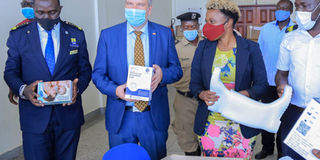There is hope for trade at Nimule-Elegu border

TradeMark East Africa and other partners have been involved in different activities such as donation of personal protective gear to promote trade safety. PHOTO | FILE
What you need to know:
Even with elaborate internal and external support, South Sudan continues to be a fragile state. However, multiple nation building programmes continue to be implemented, amid disruptions presented by Covid-19. Curfews and lockdowns at border points have been most problematic, restricting informal cross border traders from transacting across borders. Justus Lyattu had a discussion with John Bosco Kalisa, the TradeMark East Africa South Sudan programmes coordinator, in which a number of challenges were noted.
How was 2020?
It was a challenging year, but thankfully, we managed to sail through. Through our trade facilitation initiatives, we are looking for solid recovery because we have done some substantive work around the border, among which include supporting trade facilitation infrastructure as well as supporting women who have been impacted by Covid-19.
So, we are on the right track and a number of highlights including the completion of the $5m Nimule one stop border post (OSBP), have been noted.
This is a big achievement because it anchors trade facilitation initiatives, which seek to reduce barriers that hinder movement of goods and services along the Nimule border.
Secondly, we have supported South Sudan to strengthen its integration within the East African Community. The country is a new member, therefore it requires a lot of support, especially in trade policy initiatives.
Thirdly, we have appropriated support towards private sector advocacy, where we have built and strengthened capacity of the private sector in South Sudan to actively engage with the East African Business Council.
Beyond this, we have helped South Sudan to harmonise standards, using the sanitary and phytosanitary (SPS) measures given that the country depends mostly on imported food items, which calls for serious safe guards to promote health and safety.
We have also been able to channel support towards women traders, who as you might be aware, have been heavily affected by Covid-19. This has been done through providing necessary tools and equipment such as TradeMark East Africa – AMREF sensitisation and Safe Trade Zones Protocols, among others, to help trade continuation.
Finally, we have also supported shippers, freighter and forwarders to understand Covid-19-protocols as well as put in place measures that seek to strengthen freighter and forwarders associations.
You recently launched the Safe Trade Emergency Facility to mitigate the effects of Covid-19 on Trade. How has this been received?
The Safe Trade Emergency Facility (STEF) has been well received. South Sudan was the first country to launch the Safe Trade Zones at Nimule in October 2020, which seek to benefit more than 2,000 women at Nimule alone. Women and youth have been the largest victims of Covid-19, therefore, we are doing a lot of value addition to ensure recovery of particularly these groups.
A number of traders involved in cross border trade have not received personal protective equipment. What is your plan in this regard?
We have already received a number of personal protective equipment. At least by January traders at both ends of the border will have relevant safety equipment.
Some women have complained of harassment, assault and rape at border points. How do you, as TradeMark, plan to address this? Yes, indeed these are some of the issues we are addressing. You would understand, South Sudan is emerging from a conflict, so, it requires a number of measures that not only safe guard women but other traders against harassment.
We have been working with our counterparts in Uganda to ensure that truckers and women are able to report such cases through a real time SMS system.
In the past, it has been difficult but the new measures will ensure that there is a toll-line for reporting such issues.
Cross border trade has been made difficult due to a number of requirements such as Covid-19 certificates, which cost above $50. How do you plan to help traders? That issue of Covid-19 certificates is not only at Nimule and Elegu. It has been an issue across East Africa. However, EAC heads of state and ministers of health are working on a solution to have one test across the region, which can hold for 14 days before another one is taken.
The cost of these tests is very high. $50 doesn’t make business sense since most cross border traders are involved in merchandise trade. Under the safe Trade zones, we are proposing that such traders shouldn’t be tested but be required to adhere to the Covid-19 standard operating procedures.
What do you see happening in 2021?
There are a lot of expectations in 2021. As I mentioned earlier, our safe trade initiative has produced tangible results across the region. We have formulated trade policy programmes and safety requirements across the region.
We are also working on a plan with the EAC Secretariat to have an economic recovery programme that will seek to strengthen the regional value chain.
So, I see a lot of positives in 2021. 2020 was a challenging and unprecedented year. However, we positive because there is hope derived from Covid-19 vaccines, some of which are being tested while others have been deployed to vaccinate people of parts of Europe, Americas and Asia.




